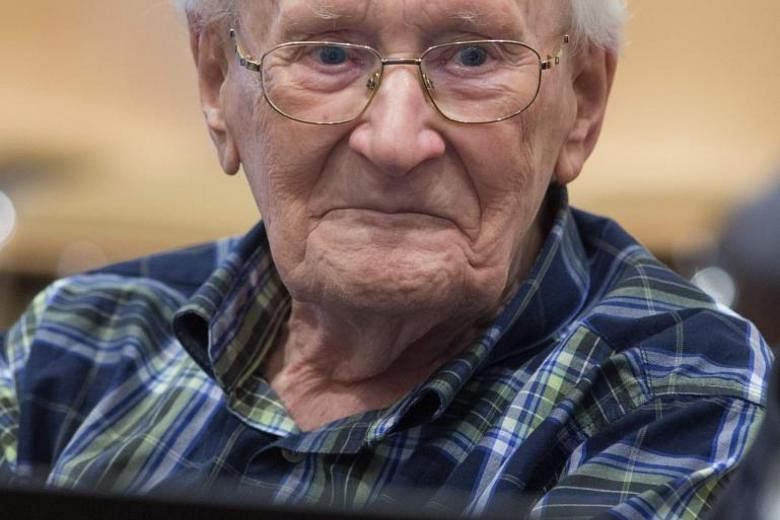LUENEBURG, Germany, July 14, 2015 (AFP) - A former SS officer known as the Book-keeper of Auschwitz said he was "very sorry" for his time stationed at the Nazi death camp, ahead of a verdict in Germany expected Wednesday.
"No one should have taken part in Auschwitz," Oskar Groening, 94, told a court in the northern city of Lueneburg on Tuesday.
"I know that. I sincerely regret not having lived up to this realisation earlier and more consistently. I am very sorry," he said, his voice wavering.
Groening has been on trial since April accused of 300,000 counts of accessory to murder in the cases of deported Hungarian Jews sent to the gas chambers between May and July 1944.
One of his lawyers Susanne Frangenberg called for an acquittal arguing that "Mr Groening's role at Auschwitz was minor".
Last week, public prosecutors said they were seeking 3.5 years' jail for Groening based on the "nearly incomprehensible number of victims", but mitigated by "the limited contribution of the accused" to their deaths.
The court, which said it would hand down its verdict on Wednesday, could sentence Groening to up to 15 years though most observers say it is unlikely he would serve jail time due to his advanced age.
Groening served as a book-keeper at Auschwitz, sorting and counting the money taken from those killed or used as slave labour, collecting cash in different European currencies, and shipping it back to Berlin.
The prosecution charges that on at least three occasions, Groening performed "ramp duty", processing deportees as they arrived by rail at the extermination and forced labour camp in Nazi-occupied Poland.
But another of Groening's defence attorneys Hans Holtermann argued on Tuesday that the state had failed to prove that he "aided and abetted a crime".
"Mr Groening was never an accessory to the Holocaust, neither with his presence at the ramp nor by transferring and counting money nor with any other actions, at least not in any legal sense," he said.
-Mr Holtermann said Groening had not participated in the "selection" of deportees at the ramp in which guards determined who would live to perform slave labour and who would be murdered immediately.
Ms Frangenberg said that should the court convict Groening, which would carry a minimum jail term of three years, it should commute the sentence because of the time he spent being repeatedly investigated since the 1970s.
The German authorities did not bring charges until last year.
Ms Frangenberg asked the judges to take into account Groening's failing health but also his willingness to testify in detail about his time in Auschwitz, which many defendants in similar cases had refused to do.
The trial, expected to be one of the last of its kind, has heard harrowing testimony by more than a dozen Holocaust survivors, who are also co-plaintiffs in the case.
One of their lawyers, Mr Markus Goldbach, acknowledged that any jail sentence for Groening would only have a "symbolic effect" but argued that for this reason the court should go beyond the 3.5-year term demanded by the prosecution.
Another of the co-plaintiffs' attorneys, Mr Stefan Lode, praised Groening for challenging Holocaust deniers with his forthright accounting of his time at Auschwitz.
"It should be viewed in his favour that he faced up to the proceedings of a trial," he said.
Groening had previously been cleared by the German authorities after lengthy criminal probes, but the legal basis for prosecuting former Nazis changed in 2011 with the trial of former death camp guard John Demjanjuk.
While previously courts had punished defendants for individual atrocities, Mr Demjanjuk was convicted solely on the basis of having served at the Sobibor camp in occupied Poland.
Some 1.1 million people, most of them European Jews, perished between 1940 and 1945 in the Auschwitz-Birkenau camp before it was liberated by Soviet forces.

